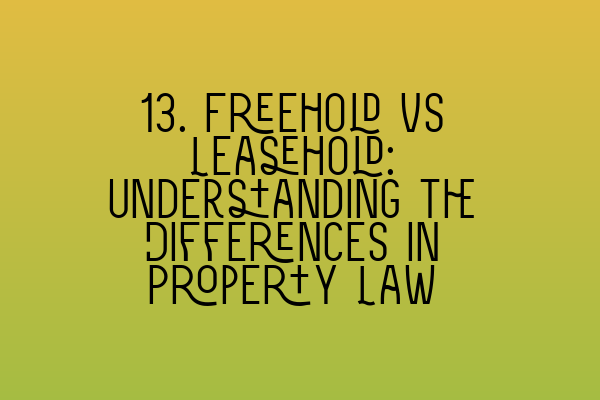When it comes to property law, one of the fundamental distinctions that individuals need to understand is the difference between freehold and leasehold properties. This differentiation has significant implications for property owners and can impact their rights, responsibilities, and financial obligations. In this article, we will delve into the nuances of freehold and leasehold properties, shedding light on the key differences between the two.
1. Freehold Properties:
A freehold property refers to a property that is owned outright by an individual. The owner has full and absolute ownership rights, which means they hold both the property and the land it stands on. Freehold properties are often seen as more desirable because they provide complete control, autonomy, and long-term security for the owner. Individuals who own freehold properties have the freedom to make decisions regarding their property without seeking external consent.
2. Leasehold Properties:
Unlike freehold properties, leasehold properties involve a lease agreement between the property owner, known as the freeholder, and the leaseholder. The leaseholder typically acquires the rights to occupy the property for a specific period, often ranging from 99 to 999 years. However, it’s important to note that the leaseholder does not own the property outright – they only have a temporary right to occupy it.
Leasehold properties are quite common in urban areas, where flats and apartments are often found. In such cases, the freeholder retains ownership of the land and the building structure, while the leaseholder pays ground rent and service charges to the freeholder. The leasehold system is designed to give the freeholder control over the management and maintenance of the building, ensuring that it remains in good condition.
3. Key Differences:
Now that we have a basic understanding of both types of properties, let’s explore the key differences between freehold and leasehold:
Ownership:
- Freehold: Complete ownership of property and land.
- Leasehold: Ownership is temporary and subject to the terms of the lease agreement.
Responsibilities:
- Freehold: Full responsibility for the maintenance and repairs of the property.
- Leasehold: The leaseholder may be responsible for certain repairs, but major maintenance and repairs are the responsibility of the freeholder.
Financial Obligations:
- Freehold: No ground rent or service charges to pay.
- Leasehold: Leaseholder may be required to pay ground rent, service charges, and additional fees as specified in the lease agreement.
Control:
- Freehold: Complete control over property-related decisions.
- Leasehold: Certain decisions may require the consent of the freeholder.
4. Which is Right for You?
The choice between freehold and leasehold properties largely depends on individual circumstances and preferences. Freehold properties offer greater autonomy and control, making them ideal for individuals who value independence and complete ownership. On the other hand, leasehold properties can be more affordable, especially for first-time buyers, although they come with additional financial obligations and limitations on decision-making.
To make an informed decision, it’s crucial to assess factors such as long-term plans, financial situation, and the terms of the lease. Seeking professional advice from a property solicitor can also help clarify complex legal terms and conditions.
If you are preparing for the SQE exam and would like to test your knowledge of property law, check out our SQE 1 Practice Exam Questions. These practice questions will help gauge your understanding and identify areas for improvement.
At SQE Property Law & Land Law, we offer comprehensive preparation courses for both SQE 1 and SQE 2 exams. Our SQE 1 Preparation Courses and SQE 2 Preparation Courses are designed to equip aspiring solicitors with the knowledge and skills necessary to excel in their exams and future legal careers.
If you’re curious about the upcoming SQE exam dates, take a look at our comprehensive list of SRA SQE Exam Dates. Stay informed and plan your study schedule accordingly.
Understanding the differences between freehold and leasehold properties is essential for anyone involved in the property market. Whether you’re a potential buyer, a landlord, or a property solicitor, being well-versed in property law will enable you to make informed decisions and navigate legal complexities with confidence.
